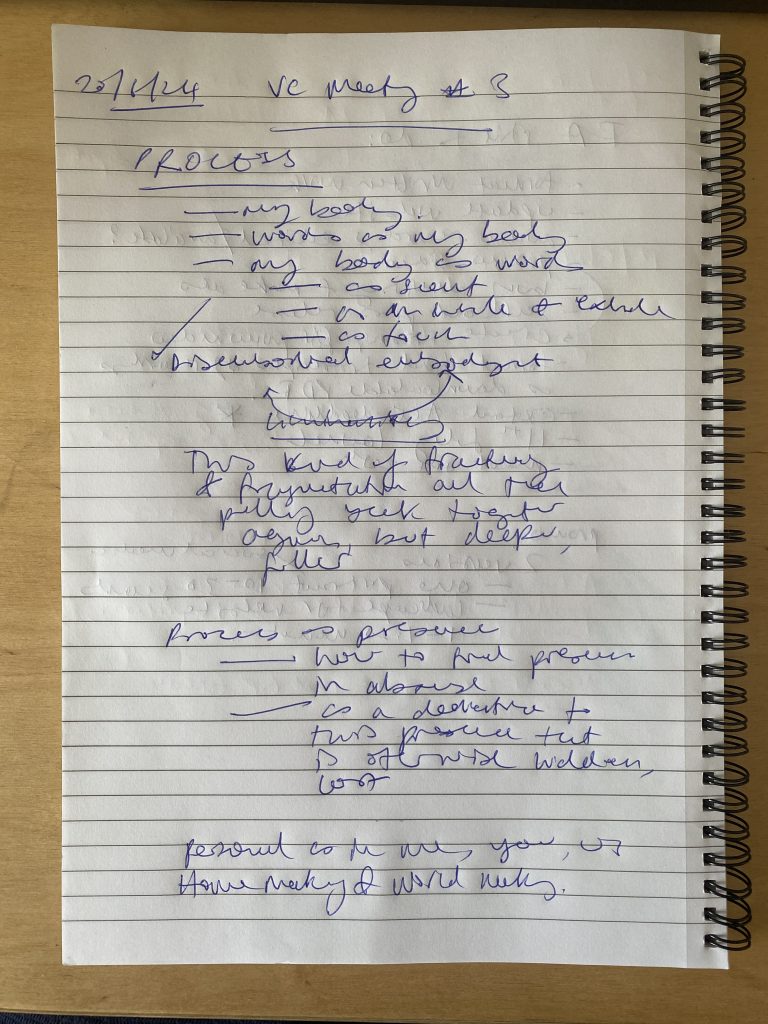We had our third group meeting of the residency on Thursday in which we were invited by Rebekah Ubuntu to reflect on what process means to us in our work, particularly within the context of the residency. I was immediately excited by this invitation, with process being so crucial and endlessly inspiring in my work. Here are my notes from this prompt (a plain text version of my notes is found in the PDF below the image):

The sharing in this session facilitated by Rebekah was incredibly nourishing for me. It was magical to be in a space shared by other crips (both present in the meeting and unable to join live), where we are both honouring and inspired by the nature of our disabilities and how that informs our making as artists. To me, process is my body, and my body is the work. It’s why when i curate it feels like making, because I am inviting other disabled artists to share their work and i’m interested in and invested in how that work emerges and is shared. Sharing the “how” of it feels as important as any of the front-facing artwork that materialises.
Process is also my lifeline. It’s what maintains a creative tethering to my existence as an artist when all i can do is be sick in bed, unable to move; when all i am able to do in a day is be on hold to my hospital clinic to try and find out my next appointment/prescription/procedure; when being sick is a purely liminal existence of medical and state benefit admin, painful conversations with the people who love you, days lived within the confines of the un-worked, the-un-able, the un-seen, un-touched, un-moved, un-made, un-written, un-spoken, un-soft, stuck-and-un-stuck, un-der recovery, rest and care. centering process in this way allows for me to recognise the presence of my making regardless of my capacity to produce. It’s an inversion of the absence that excites me so much here, the idea that making can be found in the spaces in which we cannot make; making as an archive of absence.
And there is grief here too, the pain of making without the agency that we desire or deserve. Sometimes i am confronted with this in ways that feels completely overwhelming, drenched in sadness. I can find myself longing for an ease to my work (to my life), where i can simply have thoughts and ideas, and those thoughts and ideas can spill out into other forms of life that live beyond me through art. where i can realise my potential as an artist without the limitations of sickness. where i can act upon the ideas inside my head-heart without great personal cost to my body. but that is not my body, that is not my work. process is how i can summon agency and autonomy amongst the powerlessness of sickness, where my voice can and does live, and that my art can and does emerge and have a life beyond my own. It just does so in a different way/place/pace.
/// /// ///
Huge thanks to Rebekah Ubuntu for their facilitation during this session. It is so rare to be in professional settings as disabled artists and be met with such exceptional skilled crip-wisdom in this way from the art org that you are working with. It’s a model that more residencies and art orgs should look to when thinking about how to enhance how they work with artists. Disabled artists are so skilled at how they can invite different approaches to thinking and critical creative explorations. Rebekah’s approach to their work in this way is a wonderful example of this. Thank you to Vital Capacities and Rebekah!